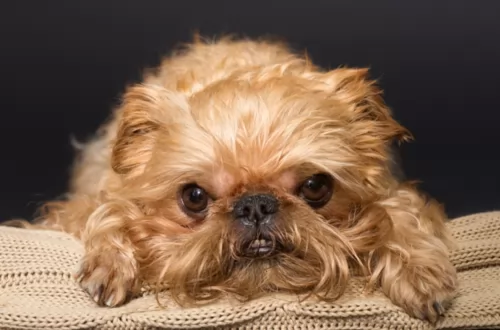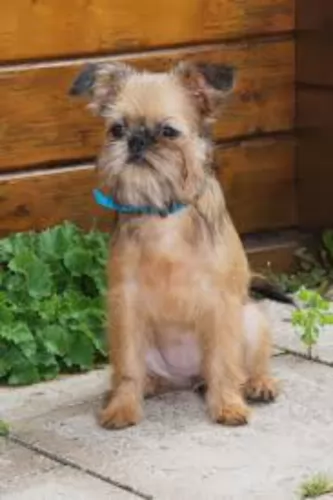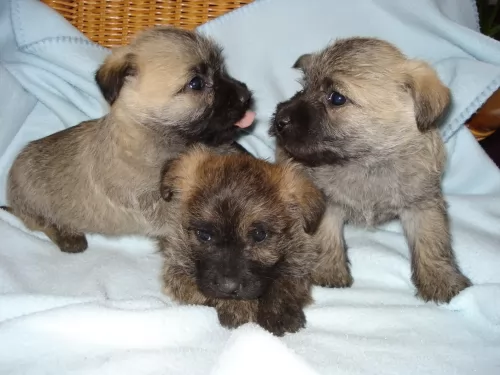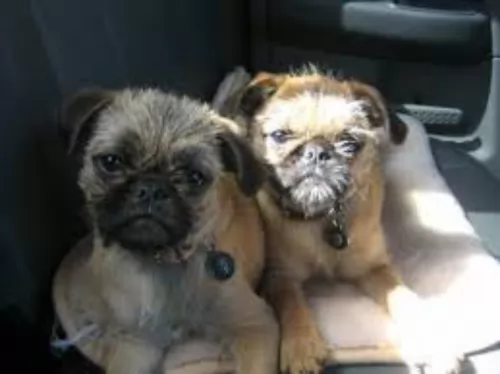 Petzlover
Petzlover Brug is originated from United States but Tibetan Terrier is originated from China. Both Brug and Tibetan Terrier are having almost same height. Both Brug and Tibetan Terrier are having almost same weight. Both Brug and Tibetan Terrier has same life span. Both Brug and Tibetan Terrier has almost same litter size. Brug requires High Maintenance. But Tibetan Terrier requires Moderate Maintenance
Brug is originated from United States but Tibetan Terrier is originated from China. Both Brug and Tibetan Terrier are having almost same height. Both Brug and Tibetan Terrier are having almost same weight. Both Brug and Tibetan Terrier has same life span. Both Brug and Tibetan Terrier has almost same litter size. Brug requires High Maintenance. But Tibetan Terrier requires Moderate Maintenance
 The Brug or Griffon Pug is not a purebred dog at this point in time. It is a cross between a Pug and a Brussels Griffon, currently known as a “designer dog” or a hybrid. This hybrid is really rare at this time but growing in popularity and breeders. Its exact history or original development is unknown at this time and needs to be researched as the hybrid develops into a breed, or breed clubs are formed. If you like either of the two breeds involved, you are sure to like the Brug. They are obviously not recognized by the major kennel clubs, but they are registered with a variety of hybrid/designer dog clubs. These include:
The Brug or Griffon Pug is not a purebred dog at this point in time. It is a cross between a Pug and a Brussels Griffon, currently known as a “designer dog” or a hybrid. This hybrid is really rare at this time but growing in popularity and breeders. Its exact history or original development is unknown at this time and needs to be researched as the hybrid develops into a breed, or breed clubs are formed. If you like either of the two breeds involved, you are sure to like the Brug. They are obviously not recognized by the major kennel clubs, but they are registered with a variety of hybrid/designer dog clubs. These include:
 The Tibetan Terrier is a medium-size breed of dog that originated in Tibet. He has always been kept as a pet and companion for Tibetan monks.
The Tibetan Terrier is a medium-size breed of dog that originated in Tibet. He has always been kept as a pet and companion for Tibetan monks.
He is still a popular companion dog, more so because he is thought to be hypoallergenic, so that even allergy sufferers can enjoy a canine friend.
This isn't a new dog breed, and if you have to go according to records, they have been around for more than 2000 years as herding dogs.
The first Tibetan Terrier was brought to Europe in 1922. The first Tibetan Terriers in the US were imported in 1956 and in 1973 the American Kennel Club recognized the breed. They're classified as a non-sporting breed.
 Like its two parental breeds, the Brug is a smaller sized dog – both parents are lab dogs and so is the Brug. Because they are hybrids, Brugs can be very different in appearance but most seem to have large eyes, squishy faces, black masks, fluffy hair, long black whiskers, short fluffy hair, flat ears and a fluffy tail. They could be in any of a number of colors including fawn, black, cream or apricot.
Like its two parental breeds, the Brug is a smaller sized dog – both parents are lab dogs and so is the Brug. Because they are hybrids, Brugs can be very different in appearance but most seem to have large eyes, squishy faces, black masks, fluffy hair, long black whiskers, short fluffy hair, flat ears and a fluffy tail. They could be in any of a number of colors including fawn, black, cream or apricot.
 The Tibetan Terrier is a medium-sized dog weighing about 8 – 14kg and standing at about 35 – 41cm in height.
The Tibetan Terrier is a medium-sized dog weighing about 8 – 14kg and standing at about 35 – 41cm in height.
People liken him to the Bearded Collie in looks. The long, shaggy, double coat of the dog is available in a number of colors such as white, grey, golden, black or tri-colored.
The dog is powerful and squarely built with floppy ears and a tail that is well feathered, long and carried curled over the back.
He has always been a dog kept by Tibetan monks. There is nothing aggressive about this dog at all and he is sweet, reserved, gentle and sensitive while also being playful and social with his human family.
These dogs thrive on human companionship and are often used as therapy dogs. He is energetic and active and will require regular exercise. He is able to adjust to life in the city or the countryside, but wherever he is, his exercise needs can never be neglected.
 This hybrid is a loyal little dog. They are an affectionate lap dog that wants to be with his humans all the time. They have a very pleasant disposition and do well with children and other dogs. They might be shy to begin with but will warm up to affection. However, they are willful and self-important at times. This is tempered by their great sense of humor and empathy to its peoples’ moods. Left alone too long, they will tend to bark excessively.
This hybrid is a loyal little dog. They are an affectionate lap dog that wants to be with his humans all the time. They have a very pleasant disposition and do well with children and other dogs. They might be shy to begin with but will warm up to affection. However, they are willful and self-important at times. This is tempered by their great sense of humor and empathy to its peoples’ moods. Left alone too long, they will tend to bark excessively.
 Tibetan Terriers are loyal ad devoted to their human family. They’re social dogs and won’t do well stuck in the back yard.
Tibetan Terriers are loyal ad devoted to their human family. They’re social dogs and won’t do well stuck in the back yard.
They are sensitive dogs, being able to sense the mood of those whom they love. They also make good watchdogs. They’re ideally suited to people who can give them the attention they crave, making splendid pets and companions.
 Usually the hybrid dog can have better health than either of the parents. This is true with the Brug as well, but there are also some issues they may inherit from the parents or face simply because of their size and complexion. These include:
Usually the hybrid dog can have better health than either of the parents. This is true with the Brug as well, but there are also some issues they may inherit from the parents or face simply because of their size and complexion. These include:
 Your Tibetan Terrier can live to be between 10 and 14 years of age but even so it is susceptible to a host of health problems. Some of the problems you may have to contend with are hip dysplasia, eye problems and heart murmurs.
Your Tibetan Terrier can live to be between 10 and 14 years of age but even so it is susceptible to a host of health problems. Some of the problems you may have to contend with are hip dysplasia, eye problems and heart murmurs.
This is a serious condition where the femur doesn't fit snugly into the pelvic socket of the hip joint. It can be painful and cause lameness even. Dogs that have hip dysplasia most certainly shouldn't be bred.
Heart murmurs are extra heart vibrations. This is because of a disturbance in the blood flow so as to produce an audible noise.
Sometimes the sound is barely audible but it can also be louder and your pet can show signs of congestive heart failure such as coughing, not being able to tolerate exercise, and being lethargic and weak.
 Don’t let this dog get overweight. Feed a high quality dry food intended for small or toy dogs. One fourth to one half of a cup per day in two separate meals is what is recommended.
Don’t let this dog get overweight. Feed a high quality dry food intended for small or toy dogs. One fourth to one half of a cup per day in two separate meals is what is recommended.
Patella Luxation or slipped knee caps – small dogs often have this issue. The patella is the knee cap and layman often called it a slipped knee cap, but it is also called slipped stifles. The femur, the tibia and the patella do not line up and this causes an abnormal gait or even lameness. Puppies are born with this, but it does not exhibit symptoms until years later. Arthritis is the most common result. Occasionally surgery is required.
Eye Issues – Cherry eye, a genetic disease, as well as irritation from air borne particles, allergies or scratches.
Skin Allergies – They can have skin allergies so watch for excessive licking or scratching.
Breathing Issues – Asthma and respiratory issues are common among small dogs with these types of faces.
Like their 2 breed parents, the Brug is a small but energetic hybrid. They need to play and run on a daily basis. Leash walks are good, but they need a yard or dog park as well. They are athletic little dogs and are good at tracking, obedience and agility. You cannot force them to do an activity but if its fun they will jump right in.
 The Tibetan will require good food and exercise to stay healthy. The commercially manufactured dog foods are always a convenient choice, but make sure to give your pet one of the better brand foods, otherwise you feed him a lot of useless ingredients such as fillers, preservatives and colorants from the cheap, inferior brands.
The Tibetan will require good food and exercise to stay healthy. The commercially manufactured dog foods are always a convenient choice, but make sure to give your pet one of the better brand foods, otherwise you feed him a lot of useless ingredients such as fillers, preservatives and colorants from the cheap, inferior brands.
Feed him some home-made food too just to add a little bit of variety to his diet. Boiled chicken, brown rice or pasta and spinach, sweet potatoes and carrots are a healthy choice for your pet.
Avoid people foods such as chocolates, onions, spices, chips etc as these can just upset his stomach and push your vet fees up. Always ensure he has a constant supply of fresh, cool water.
Brush your Tibetan Terrier. He has a long shaggy coat so will require brushing at least twice a week.
Brushing your dog regularly will help to reduce shedding. Many people opt to take the dog to professional groomers and have the coat professionally clipped. The groomers will also trim your dog’s nails and clean the inside of your dog’s ears.
Before you get a dog, make sure you have a reliable veterinarian. It’s no good if your pet becomes ill, maybe even some kind of an emergency, such as bloat, and you don’t know where to take your pet.
You need to be aware of a vet that is open 24/7. Your Tibetan will need to have your vet vaccinate him against some of the deadly diseases there are.